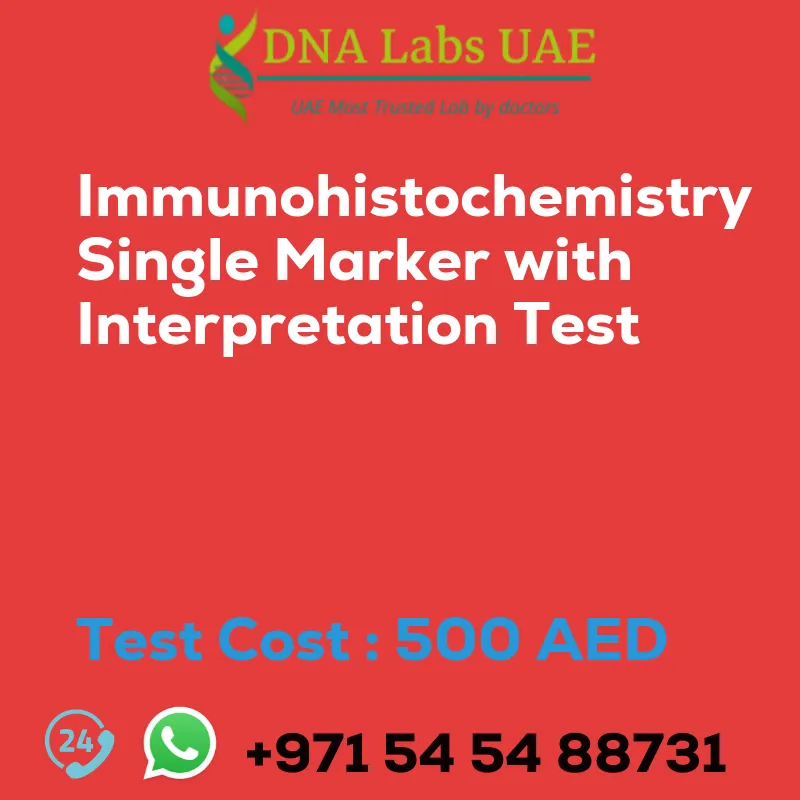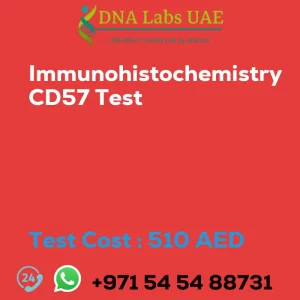IMMUNOHISTOCHEMISTRY SINGLE MARKER WITH INTERPRETATION Test
Test Cost: AED 500.0
Symptoms Diagnosis: N/A
Test Components: Immunohistochemistry Single Marker with Interpretation
Price: 500.0 AED
Sample Condition: Submit tumor tissue in 10% Formal-saline OR Formalin fixed paraffin embedded block. Ship at room temperature. Provide a copy of the Histopathology report, Site of biopsy and Clinical history.
Report Delivery: 10 days
Method: Immunohistochemistry
Test Type: Cancer
Doctor: Oncologist, Pathologist
Test Department: Histology
Pre Test Information: Provide a copy of the Histopathology report, Site of biopsy and Clinical history.
Test Details
Immunohistochemistry (IHC) is a technique used in pathology to detect specific proteins in tissue samples. It involves the use of antibodies that bind to specific proteins of interest, followed by the detection of the antibody-protein complex using a visualization method.
A single marker immunohistochemistry test refers to the detection of a specific protein using a single antibody. The choice of marker depends on the specific question being asked and the protein of interest. For example, common markers used in immunohistochemistry include cytokeratins for epithelial cells, CD20 for B-cells, and CD3 for T-cells.
Interpretation of an immunohistochemistry test involves examining the staining pattern and intensity of the protein of interest. The presence or absence of staining, as well as the cellular localization (e.g., cytoplasmic, nuclear, membranous), can provide important diagnostic and prognostic information.
Interpretation can vary depending on the specific marker and the context in which it is being used. For example, in breast cancer, the presence of estrogen receptor (ER) and progesterone receptor (PR) staining indicates hormone receptor positivity, which can guide treatment decisions. Similarly, the presence of human epidermal growth factor receptor 2 (HER2) staining can indicate a more aggressive form of breast cancer and guide targeted therapy options.
It is important to note that interpretation of immunohistochemistry results should be done by trained pathologists who are familiar with the specific markers and their significance in different disease contexts.
| Test Name | IMMUNOHISTOCHEMISTRY SINGLE MARKER WITH INTERPRETATION Test |
|---|---|
| Components | |
| Price | 500.0 AED |
| Sample Condition | Submit tumor tissue in 10% Formal-saline OR Formalin fixed paraffin embedded block. Ship at room temperature. Provide a copy of the Histopathology report, Site of biopsy and Clinical history. |
| Report Delivery | 10 days |
| Method | Imunohistochemistry |
| Test type | Cancer |
| Doctor | Oncologist, Pathologist |
| Test Department: | HISTOLOGY |
| Pre Test Information | Provide a copy of the Histopathology report, Site of biopsy and Clinical history. |
| Test Details |
Immunohistochemistry (IHC) is a technique used in pathology to detect specific proteins in tissue samples. It involves the use of antibodies that bind to specific proteins of interest, followed by the detection of the antibody-protein complex using a visualization method. A single marker immunohistochemistry test refers to the detection of a specific protein using a single antibody. The choice of marker depends on the specific question being asked and the protein of interest. For example, common markers used in immunohistochemistry include cytokeratins for epithelial cells, CD20 for B-cells, and CD3 for T-cells. Interpretation of an immunohistochemistry test involves examining the staining pattern and intensity of the protein of interest. The presence or absence of staining, as well as the cellular localization (e.g., cytoplasmic, nuclear, membranous), can provide important diagnostic and prognostic information. Interpretation can vary depending on the specific marker and the context in which it is being used. For example, in breast cancer, the presence of estrogen receptor (ER) and progesterone receptor (PR) staining indicates hormone receptor positivity, which can guide treatment decisions. Similarly, the presence of human epidermal growth factor receptor 2 (HER2) staining can indicate a more aggressive form of breast cancer and guide targeted therapy options. It is important to note that interpretation of immunohistochemistry results should be done by trained pathologists who are familiar with the specific markers and their significance in different disease contexts. |







